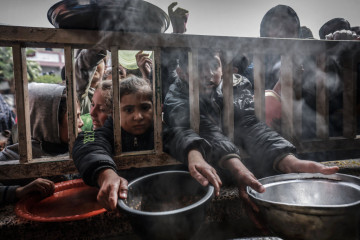

Alongside the worsening humanitarian crisis in Gaza, the economic situation has become dire since the war began.
Most people have lost their incomes, and the prices of basic goods have skyrocketed due to shortages.
Banks have not been operational since October 7 last year, ATMs have been destroyed, and cash has started disappearing from the market.
The coastal enclave has been under a restricted siege after borders were completely shut down following Israel's takeover of the Rafah border as part of its military operation that started in early May.
"We still have flour and canned food, but we don't have either cooking gas or wood for cooking. We rely on canned food, which is not a good choice for my children"
Almost half a million Palestinians in northern Gaza do not have sufficient food, with many relying on flour or canned food they had stored before May 2024. Many have not eaten meat or vegetables in a month.
In the south, where humanitarian aid used to enter before May, people still have some food stored.
Amani Kumail, 40, who is still in her home in northern Gaza, said that for the past few weeks, she has found it very hard to cook food for her four children due to the severe lack of main ingredients.
“We still have flour and canned food, but we don’t have cooking gas or wood. We rely on canned food, which is not a good choice for my children,” Amani told The New Arab in a phone interview.
Amani says that 1 kg of tomatoes can cost up to 100 NIS ($26) if found. “How can we afford this when everyone has lost their jobs since the war began?”
The majority of the population in Gaza lost their jobs as the war broke out. Many business areas have been destroyed, and the remaining shops are now desolate, as the dangerous situation has made it impossible for them to operate.
To access cash, people have to transfer money through mobile banking apps to others who have cash on hand, incurring fees of up to 20% of the withdrawn amount. While 100 USD is worth more than 370 NIS outside Gaza, it is exchanged for less than 300 NIS within Gaza.
The dire humanitarian situation has varied between northern and southern Gaza. Northern Gaza hasn’t received humanitarian aid distributions for months, leading to the deaths of dozens of children from malnutrition and dehydration up until March, according to the Gaza Ministry of Health.
Northern Gaza currently has a severe shortage of vegetables and fruits due to the presence of the Israeli military in most agricultural areas. Meanwhile, people in the south still have access to some produce, such as tomatoes and cucumbers, but at a cost of over 10 NIS per kilo.
The World Food Program (WFP) warned earlier last week that the ongoing conflict in Palestine is worsening acute hunger, leading to starvation and death amid widespread destruction and displacement in the Gaza Strip.
“By mid-July, over one million people, half of Gaza's population, are expected to face extreme hunger and starvation,” the report said.
On Sunday, June 9, the director of the UN World Food Programme announced that it had "paused" its distribution of humanitarian aid from the American Pier due to "concerns about the safety of our people."
This decision follows the incident on June 8 in Nuseirat, where hundreds were killed during an Israeli operation to free four Israeli captives.
Suha Arafat, currently sheltering in a tent by the beach in central Gaza, said she relies on the money her relatives send her from abroad to buy basic goods which are sold at “crazy prices.”
“Money transfer offices charge me up to 10% of the money coming in, and sometimes I can’t get the money at all due to the lack of cash in the market,” she explained.
Suha says she has to buy everything for her family, including drinking water, due to the lack of humanitarian handouts.
“I use the seawater for cleaning and washing; this is the only source we have.”
Earlier this month, the Palestinian Ministry of Health in Gaza reported that since October 7, over 37,400 Palestinians have been killed and more than 85,600 injured.
Patients who had planned to leave Gaza for medical treatment now face severe complications due to the border closure and the collapse of the healthcare system.
Mustafa Muhammed, aged 36, currently sheltering in Nuseirat after fleeing Rafah last month, stated that the food situation in the south has deteriorated since early May.
Mustafa complained of the “greedy people” who charge extra money for everything, including cash withdrawals, saying the disappearance of police has made things worse.
“I lost my job since the war began, but I still have to buy quality food and formula milk for my baby, which is not available. We fear that the worst is yet to come."
Abeer Ayyoub is a freelance journalist based in Istanbul
Follow her on X: @abeerayyoub



 Follow the Middle East's top stories in English at The New Arab on Google News
Follow the Middle East's top stories in English at The New Arab on Google News


